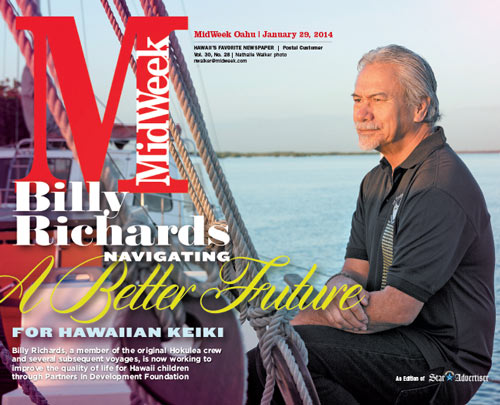Billy Richards – Navigating A Better Future for Hawaiian Keiki
One of the foundation’s best known programs is a tuition-free traveling preschool called Tutu and Me, established in 2001. This nationally recog-nized program set the pattern of using traditional Hawaiian values in building stronger family relationships and community bonds.
“Tutu and Me is the cornerstone,” Richards says. “Our traveling preschool goes into native Hawaiian communities where there are folks who can’t afford to send their kids to preschool.
“It’s family-child interactive learning in a mobile setting, such as a beach or playground. Parents don’t drop off a child and go away. The caregiver stays with the child, then goes to a group session to get guid ance on how to continue the education at home,” he explains.
“We find that many grandparents (40 percent among native Hawaiians) are caring for grandchildren while parents are working,” he says. “It’s perhaps been a while since grandparents have had to care for children, so it’s a new kuleana (responsibility) that needs nurturing.
“Most, if not all, PID programs require family involvement and commitment,” he adds.
The intergenerational Tutu and Me model is used by the YMCA nationally as a signature early education program.
Another program with PID branding and success is Ka Paalana (A Light for the Future) Homeless Family Education. This innovative program serves homeless and at-risk families on the Leeward coast of Oahu through preschool and outreach services. Since 2007, it has served more than 6,400 families and transitioned more than 300 from beach to shelters.
“It employs seven former program participants, five of whom are enrolled in early childhood education courses,” Richard says proudly. “It is the first preschool in the nation serving the homeless to receive accreditation from the National Association for the Education of Young Children (NAEYC).”
The accreditation process is a stringent audit of scholastic achievement and accountability. Achieving it brings a priceless commodity: credibility.
Add to that last summer’s Innovation Award from Generations United, and it would seem that PID is well on its way to breaking through the cycle of obscurity.
“Even if it is Hawaii’s best known secret,” smiles Richards.
It won’t be for long if he continues to do his job and illuminates the contribution of PID’s 300 professionals, people such as program director Danny Goya who are “compassionate, dedicated souls who work miracles every day.”
Over the past 16 years, Partners in Development Foundation has developed landmark programs in education for preschoolers to adults, social services for families, and environmental preservation in cluding sustainable Hawaiian agriculture. These publicly funded programs now serve close to 10,000 people in communities throughout Hawaii each year.
As Richards, the voyager and community crusader, talks about his job, we can’t help but make an analogy between his seafaring passion and social work.
They are both forms of navigating through life, through cultural and tradition, and the promise of tomorrow.
The man who made Hokulea’s first trip of discovery is now engaged in a voyage of another sort. He is facilitating a better way of life for struggling native families and children.
He and PID colleagues approach their assignments from the premise of five core values: aloha (respect), lokahi (balance), malama (nurture), pono (righteousness), and pookela (excellence).
Just as Polynesian navigators sought the ancient secrets to wayfinding and the art of building sturdy voyaging canoes, so do Richards’ contemporaries want to preserve their identity and knowledge for new generations.
Smooth sailing, Billy Richards. May your Hawaiian odyssey be safe harbor for many.






